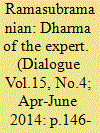| Srl | Item |
| 1 |
ID:
132116


|
|
|
|
|
| Publication |
2014.
|
| Summary/Abstract |
The advent and domination of modern technology today extends from our daily domestic use all the way to national defence and international communications.
However, whenever the questions are posed about the modern technology such as the nuclear power plant in Koodankulam or the introduction of genetically modified crops, we find that even the best among us don't have a framework or approach that is clear and easy to understand. Question such as: what is the limit to the usage of modern technology? How do we measure its benefits as against its harms? And more importantly, when to reject modern technology? Are not always eliciting a clear response from intellectuals, leaders and even scientist and technocrats. We find that they are unable to balance their professional interest against the common interest for humanity.
|
|
|
|
|
|
|
|
|
|
|
|
|
|
|
|
| 2 |
ID:
187743


|
|
|
|
|
| Summary/Abstract |
Through the lens of the multinational staff of the Chinese Maritime Customs Service (CMCS), this article argues that a technocratic programme of reconstruction evolved in the Nationalist government's wartime efforts on post-war planning, which refashioned a cadre of foreign (semi-)colonial-era experts into technocrats serving a sovereign state. This episode, in which the weakened Customs Service reclaimed its significance for the Chinese state, occurred in China's wartime capital, Chongqing. After the abrogation of the so-called ‘unequal treaties’ with foreign powers in January 1943, China entered a post-treaty era, and the question of retaining long-serving foreign Customs Service employees perplexed Nationalist leaders. Eventually, China's huge post-war need for foreign expertise, networks, and imports led to a moderate staff reorganization of the CMCS, with foreign technocrats being kept on and other bureaucrats either shifted to advisory positions or being forced to retire. Technical expertise provided a new guise for the European and American presence in post-imperialist China. Taking the rehabilitation of coastal lighthouses as an example, this article demonstrates the significance of foreign technocrats to the Chinese state during the last phase of the Sino-Japanese War and in its immediate aftermath. In showing the ambition and preparations of the Nationalist government for a post-war era, this article corrects a narrative of an all-out collapse of the Nationalist government from the mid-1940s. The wartime evolution of the Customs Service further highlights the growing importance of technocrats in the decolonizing world.
|
|
|
|
|
|
|
|
|
|
|
|
|
|
|
|